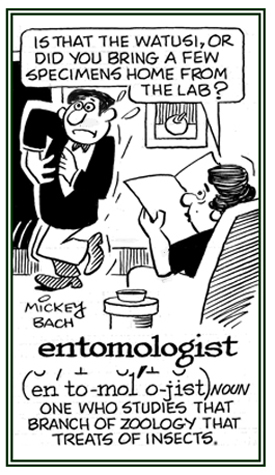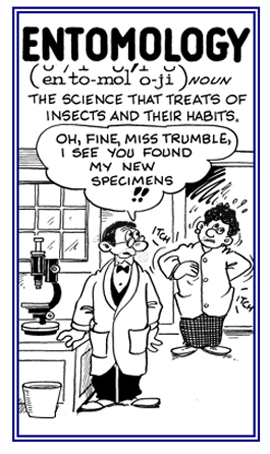-ology, -logy, -ologist, -logist
(Greek: a suffix meaning: to talk, to speak; a branch of knowledge; any science or academic field that ends in -ology which is a variant of -logy; a person who speaks in a certain manner; someone who deals with certain topics or subjects)
The word -ology is a back-formation from the names of certain disciplines. The -logy element basically means "the study of ____". Such words are formed from Greek or Latin roots with the terminal -logy derived from the Greek suffix -λογια (-logia), speaking, from λεγειν (legein), "to speak".
The suffix -ology is considered to be misleading sometimes as when the "o" is actually part of the word stem that receives the -logy ending; such as, bio + logy.
Through the years -ology and -logy have come to mean, "study of" or "science of" and either of these suffixes often utilize the form of -ologist, "one who (whatever the preceding element refers to)".
The examples shown in this unit represent just a small fraction of the many words that exist in various dictionaries.
2. A medically qualified specialist in internal medicine who has subspecialised in the diseases of glandular organs.
2. The study of hormones, their receptors, the intracellular signalling pathways they invoke, and the diseases and conditions associated with them.
Will Shortz is the senior editor of Games magazine and puzzlemeister on National Public Radio's "Weekend Edition". At Indiana University, he became the first and only person to major in puzzles and, in 1974, to receive a degree in enigmatology.
2. The system of making riddles or the skills used in solving them: Enigmatology involves the investigation of, or the science of, puzzle creations and their solutions.Additional information about Will Shortz and Enigmatology
By the age of 15, Shortz was already writing a puzzle book, and selling his work to national magazines. His fascination with puzzles continued into college where, through the independent learning program at the University of Indiana, he created his own college curriculum in enigmalology. "The people at IU were pretty skeptical at first," Shortz said, "but they came around."
Shortz was able to find professors who were willing to work with him on courses of his own devising, in various disciplines, all related to puzzles. He obtained his degree in 1974, after completing courses such as "Creation of Mathematical Puzzles", "Word Puzzles in the 20th Century", and "The Psychology of Puzzles".
His thesis, on "American word puzzles before 1860", was published in a national journal of recreational linguistics.
In addition to his puzzle constructions and solutions, Shortz has also established a collection of puzzle-related books and magazines. He is said to have over 3,000 of them, dating back to the 18th century.
Puzzles "appeal to my mind," Shortz said, in describing why his childhood hobby became the focus of his life. "I love to think and exercise my brain. Puzzles are very satisfying because they take you into almost every other field of endeavor, and you learn something about history, art, music, or any subject you can think of."

Go to this Word A Day Revisited Index
so you can see more of Mickey Bach's cartoons.
2. Etymology: from French entomologie (1764), coined from Greek entomon, "insect" + logia, "study of".
Entomon is the neuter form of entomos, "having a notch or cut (at the waist)"; so called by Aristotle in reference to the segmented division of insect bodies.
Scientists who study insects (there are close to a million that can be studied) are called entomologists. Then why aren't they called "insectologists"? Well, they are.
The word insect comes from the Latin word insectum, meaning "cut up" or "divided into segments".
The plural of insectum, namely insecta, is used by scientists as the name of the taxonomic class that insects belong to.
This Latin word was created in order to translate the Greek word for "insect", which is entomon and literally means "cut up" or "divided into segments", and it is the source of the word entomology.
The Greeks coined this term for insects because of the division of insect bodies into three segments, now called the head, thorax, and abdomen.

Go to this Word A Day Revisited Index
so you can see more of Mickey Bach's cartoons.
2. The origin and development characteristics of a particular disease.
Epistemology is the determination of what distinguishes justified beliefs from mere opinions.


